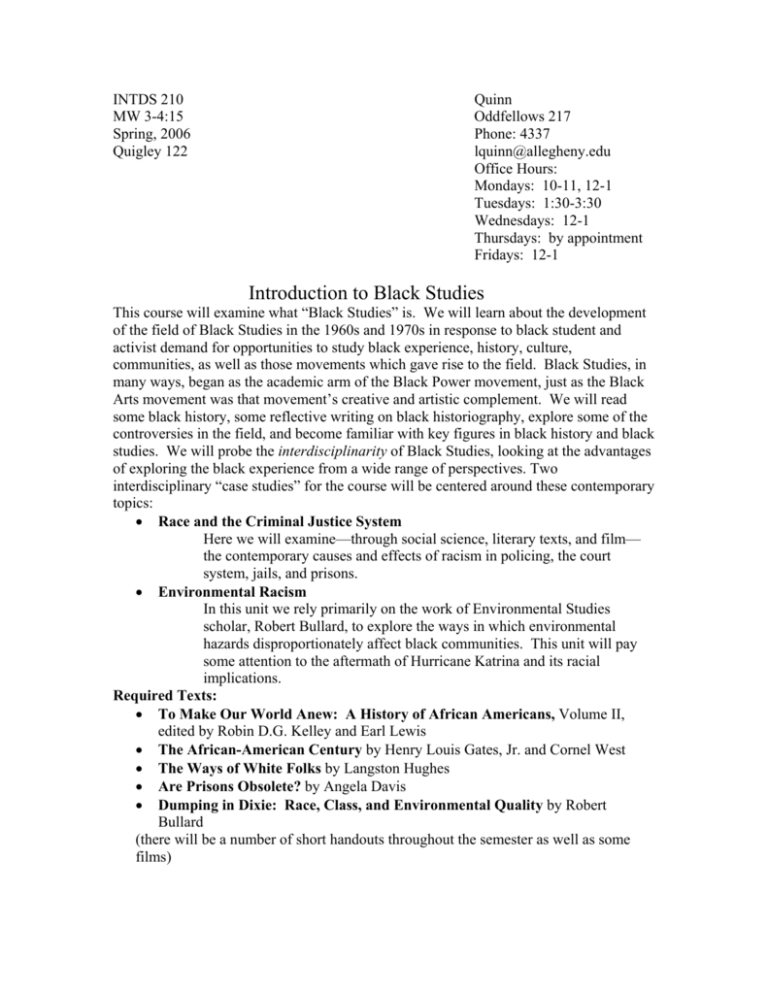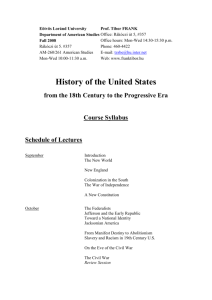INTDS 210
advertisement

INTDS 210 MW 3-4:15 Spring, 2006 Quigley 122 Quinn Oddfellows 217 Phone: 4337 lquinn@allegheny.edu Office Hours: Mondays: 10-11, 12-1 Tuesdays: 1:30-3:30 Wednesdays: 12-1 Thursdays: by appointment Fridays: 12-1 Introduction to Black Studies This course will examine what “Black Studies” is. We will learn about the development of the field of Black Studies in the 1960s and 1970s in response to black student and activist demand for opportunities to study black experience, history, culture, communities, as well as those movements which gave rise to the field. Black Studies, in many ways, began as the academic arm of the Black Power movement, just as the Black Arts movement was that movement’s creative and artistic complement. We will read some black history, some reflective writing on black historiography, explore some of the controversies in the field, and become familiar with key figures in black history and black studies. We will probe the interdisciplinarity of Black Studies, looking at the advantages of exploring the black experience from a wide range of perspectives. Two interdisciplinary “case studies” for the course will be centered around these contemporary topics: x Race and the Criminal Justice System Here we will examine—through social science, literary texts, and film— the contemporary causes and effects of racism in policing, the court system, jails, and prisons. x Environmental Racism In this unit we rely primarily on the work of Environmental Studies scholar, Robert Bullard, to explore the ways in which environmental hazards disproportionately affect black communities. This unit will pay some attention to the aftermath of Hurricane Katrina and its racial implications. Required Texts: x To Make Our World Anew: A History of African Americans, Volume II, edited by Robin D.G. Kelley and Earl Lewis x The African-American Century by Henry Louis Gates, Jr. and Cornel West x The Ways of White Folks by Langston Hughes x Are Prisons Obsolete? by Angela Davis x Dumping in Dixie: Race, Class, and Environmental Quality by Robert Bullard (there will be a number of short handouts throughout the semester as well as some films) 2 Schedule of Readings and Assignments: January 18 Introduction to Course; a few poems 23 25 “Breaking the Chains, 1860-1880” by Frankel (handout) “Though Justice Sleeps, 1880-1900” by Bair in To Make 30 “A Chance to Make Good, 1900-1929” by Grossman in To Make; also pages 1-41 in African-American Century Read “Cora Unashamed,” “Slave on the Block,” and “Rejuvenation Through Joy,” in The Ways of White Folk; first paper assigned February 1 6 8 13 15 No class: I am at a conference; work on papers No class; conference; work on papers 20 “From a Raw Deal to a New Deal? 1929-1945” in To Make; pages 114-151 in African-American Century Papers due at beginning of class; view Ethnic Notions; second paper assigned 22 27 March 1 6 April View and discuss “Two Dollars and a Dream”; pages 42-114 in African-American Century Readings on lynching and anti-lynching activism (handouts); Slides from exhibit “Without Sanctuary” “We Changed the World, 1945-1970” by Harding, Kelley, Lewis in To Make Read 152-271 in African-American Century 8 Read “The Blues I’m Playing,” Red-Headed Baby,” and “Poor “Poor Little Black Fellow” in The Ways of White Folks View The Defiant Ones 13 15 “Into the Fire: 1970 to the Present” by Kelley in To Make Read 272-383 in African-American Century 20 22 Spring Break Spring Break 27 29 Read Chapters 1-3 of Are Prisons Obsolete?; third paper assigned Finish Are Prisons Obsolete? Second papers are due in my office by noon on Friday, March 31 3 5 Further readings on race and the criminal justice system—TBA More readings on race and prison--TBA 3 10 12 Read Chapters 1-3 of Dumping in Dixie Chapters 4-5 of Dumping in Dixie 17 19 Chapters 6-7 of Dumping in Dixie Further readings on environmental racism—TBA 24 26 May 1 Readings on New Orleans and Katrina--TBA Further readings on Katrina and related issues—TBA Read “Father and Son” from The Ways of White Folks Research Papers will be due at the time of our final exam (there will be no exam); this is 7:00 p.m. on Tuesday, May 9. We will discuss the research papers (in lieu of an exam) and eat pizza. Grade Distribution: First Paper: 20% Second Paper: 25% Research Paper: 30% Participation: 25% Papers: For each of the papers you will be provided with a detailed handout, with specific instructions and guidelines. Papers will increase in length and complexity as the semester wears on. Class participation is an important part of your grade and will be taken very seriously as a requirement for the course. Some participation will be structured and assigned, but, for the most part, you are responsible for your own level of participation in class. If classroom participation is difficult for you, remind yourself that writing papers and/or taking exams are also difficult for some people; yet, students are routinely required to write papers, take exams, and get graded on both. See the attached handout for the standards by which you will be graded for class participation. 4 Rules and Regulations: 1. You are expected to complete the reading for each class session and to participate actively in discussion of the reading. Class participation will be graded on the basis of the criteria below. 2. All assigned work for the course must be completed by the end of the semester if you are to pass the course. Failure to complete any of the written work will result in failure for the course. This applies to those taking the course for credit/no-credit as well as those on a grade basis. 3. Attendance is a baseline requirement; unexcused absences will factor into your class participation grade. Anyone who misses an excessive number of classes will fail the course. 4. All papers must be word-processed and follow standard academic paper format. They must be spell-checked and carefully proofread. 5. Late papers will only be accepted in documented emergency circumstances. 6. I am unable because of time and other factors to read your rough drafts; drafting papers is your responsibility. Should you need a considerable amount of assistance with your writing, you should go to the Learning Commons and get matched with a tutor. I will be happy to discuss your papers with you in my office in terms of clarifying the assignments, but I will not help you write your papers. This is a selective private liberal arts college, and you are all qualified students, able to do your own work. Criteria for Grading Papers: 1. An A paper will be --polished and error-free --insightful, going well beyond the obvious and well beyond what was said in class --thoroughly developed and logically structured 2. A B paper will be --well-written overall, but with some minor lapses --above average in insight, but less original than the A paper --competently developed but a little less thorough than an A paper 3. A C paper will be --competently written but with a number of minor or a few major lapses --average in insight and originality --readable in terms of organization and structure but in need of more coherence 4. A D paper will be --error-ridden and un-proofread --below average in insight and originality 5 --disorganized and hard to follow 5. An F paper will be --unreadable because of writing errors --inaccurate and/or otherwise irresponsible in content --incoherent Important: Any instances of plagiarism, whether intentional or “accidental” will automatically result in a failure on the assignment and notification of the Honor Committee. You will not be allowed to rewrite a plagiarized paper. If you are not clear about the definition of plagiarism, read the relevant section in The Compass. Criteria for Grading Class Participation: A participation is marked by its active nature, its consistency, and its quality. An A participant doesn't wait to respond to questions that the instructor poses but initiates discussion by coming prepared with questions, ideas, observations about the reading assigned that day. This participant will also be consistently engaged in class discussion, always letting me know that she/he has engaged the reading thoroughly and thoughtfully. Finally an A participant will not try to substitute quantity of participation for quality (being consistent is not the same thing as dominating a discussion). To earn the highest grade for your participation, you will want to make it possible for others to participate productively too (this is not a competition); thus, habits such as interrupting others and taking up too much conversational space will not enhance your grade. It will also do you no good to participate if you haven't done the reading. I expect participation to be firmly grounded in careful and thoughtful reading. As the A reader reads, she or he prepares to participate in a class discussion with other readers. A B discussant is less consistent than an A in initiating discussion but is active in responding to questions or problems posed by the professor and other students. To get a B in participation, you will need to be in class and talk regularly--more, certainly, than once during a class session once a week or so. Regular means regular. This level of class participation will also communicate clearly to me that you have done all the reading for the day and that you have done it thoughtfully. This level will also include productive discussion habits, such as engaging the ideas of others, not dominating, listening carefully, etc. A C grade for participation means that you have contributed in an average way to the discussion. Your contributions have been less frequent than those of the B participant or have let me know that you are not always keeping up with the reading or have, in some way, interfered with good discussion--for instance, a "dominator" would get credit for participating often but would get knocked down to a C for taking over and not engaging others in discussion. In short, you have not been silent or absent or altogether uninvolved, but your involvement did not work consistently to make the class a productive learning experience. 6 A D grade means that you were there physically most of the time and maybe even piped up three or four times during the semester but that's it. It's just the grade it should be-a minimal passing grade. An F grade should need no explanation.








